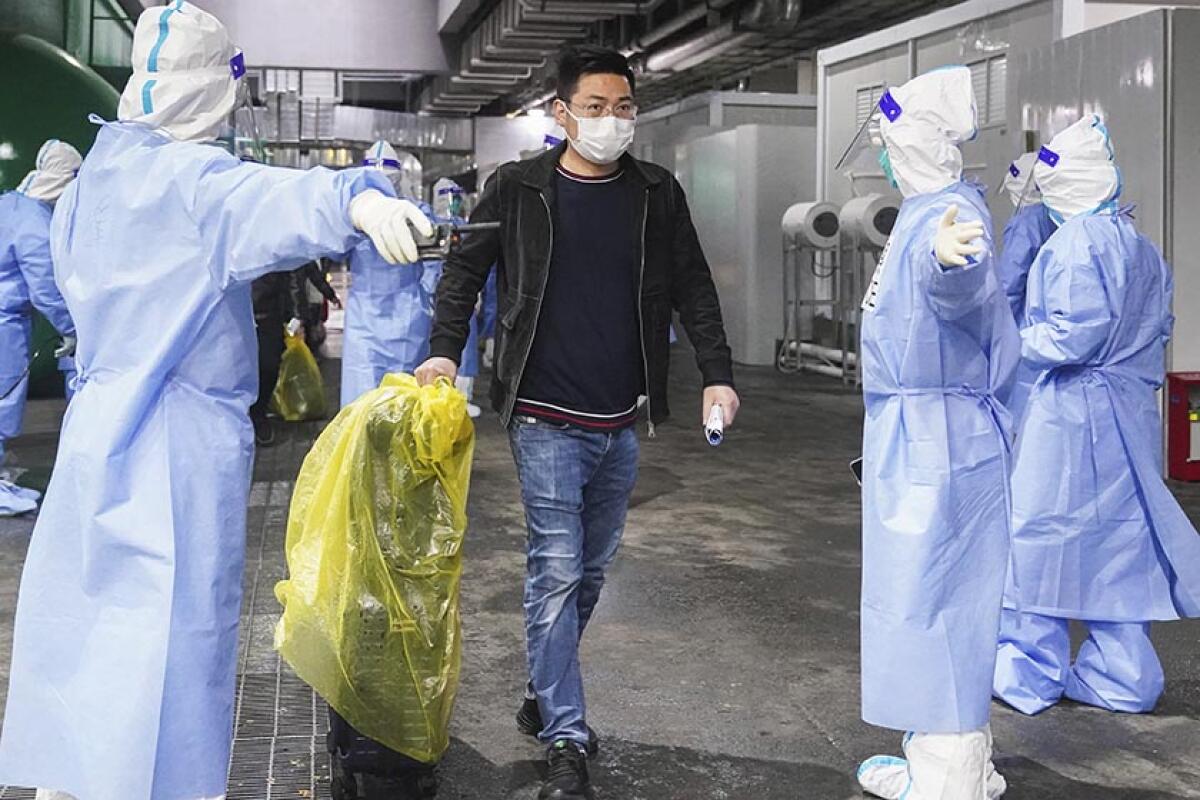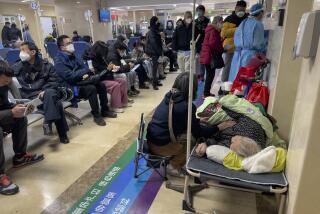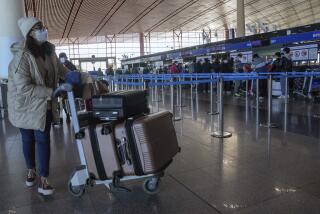Human toll from Shanghai lockdown fuels public frustration

- Share via
TAIPEI, Taiwan — Larry Hsien Ping Lang wrote recently on China’s Twitter-like platform Weibo that his 98-year-old mother needed treatment for a failing kidney, but was required to provide a negative COVID-19 test before entering the hospital.
Her fate, he wrote, was avoidable: She died while awaiting her test result outside.
Such tales of family loss have become public in recent weeks largely via the internet as residents of Shanghai, the country’s largest city, grappled with the government’s antivirus shutdown that has confined much of the population to their homes since March and curtailed access to food, medicine and other necessities.
Although many Chinese cities have locked down during local outbreaks, the deteriorating situation in Shanghai has become particularly contentious as residents have taken to social media to voice their complaints.
On Wednesday, Shanghai, with a population of about 25 million, allowed 4 million more people to leave their homes as restrictions eased. Roughly 12 million total have been allowed to go outside since last week.
“You don’t want the solution to be worse than the problem,” said Dali Yang, a professor of political science at the University of Chicago. “And I think this is clearly the case in Shanghai.”
On Wednesday, the government reported 19,927 new cases in China’s mainland, all but 2,761 of which had no symptoms, according to the Associated Press. Shanghai accounted for 95% of the total, or 18,902 cases, of which 2,495 had symptoms.
Previously, the ruling party’s “zero-COVID” strategy of anti-coronavirus restrictions helped keep China’s economy humming and the pandemic death rate low as other countries struggled, seen domestically as validation of President Xi Jinping’s leadership and China’s superior governance compared with the West.
As of Wednesday, China has recorded about 13,800 COVID-related deaths, according to the Coronavirus Resource Center at Johns Hopkins University. Meanwhile, the U.S., with a much smaller population, has recorded about 990,000 deaths.
But China’s tightening of restrictions came at a time when the rest of the world seemed eager to drop them.
“There was a lot of national pride in what China was able to do. To have to deal with almost like a boomerang of the virus is psychologically a big, big challenge,” Yang said.
As COVID cases surged in Shanghai, officials implemented harsh restrictions that left many without food or medical care. By the time the city recorded its first official COVID death on Monday, some residents were mourning other losses during the citywide lockdown.
On March 23, Zhou Shengni, a nurse at Shanghai East Hospital, reportedly died a few hours after an asthma attack went untreated. Her family had brought her to the hospital, but it was closed for disinfection as the city locked down.
Her death was seen as a tragic consequence of a health system still scrambling to get a spiraling outbreak under control. As similar stories and calls for help have mounted, so has the public’s anger at local authorities.
Last week, an essay simply titled “Shanghai’s Deceased” began circulating on Chinese social media. The author listed a dozen deaths, starting with Zhou’s, that were blamed in one way or another on stringent COVID restrictions, from patients being denied treatment to suicides. The post was censored, but not before others added what they described as their own similar experiences in the comments.
“They didn’t die from COVID, but because of COVID they died,” said one attempt to commemorate the losses. “They should not be ignored or forgotten.”
Much of the criticism stemmed from the perceived neglect of the city’s oldest and most vulnerable residents. In a recent viral audio recording, an elderly Shanghai resident surnamed Yu called a neighborhood committee to report that he was feeling unwell, but hadn’t been able to get any help.
“I can’t bear it anymore,” the man said. “Can’t they save us ordinary folks?”
The agitated worker explained that he had sent the man’s case up the chain of command, but had no other course of action.
“I’m also very worried, I’m also very indignant, I’m also very angry,” the worker exclaimed in the recording. “I’m telling you I’m powerless, I don’t have any idea what to do.”
One Shanghai resident wrote online: “Isn’t zero-COVID supposed to protect children, elderly and people with underlying illness? Then lately why are all those suffering the most the people zero-COVID is supposed to protect?”
For Ting Guo in Hong Kong, sleep hasn’t come easy since her home city, Shanghai, locked down. In particular she worries about her father, who has had two heart attacks in the last two years.
“It’s really heart-wrenching seeing the news every day,” she said. “Whether it’s zero-COVID or not, really what concerns everyone is: How can we make this more humane?”
Guo, an assistant professor of language studies at the University of Toronto, has taken to scouring China’s web for pleas for help, in case she is able to offer any assistance. Many Chinese internet users have flocked to social media in recent weeks for information, medical attention or other aid.
“People are desperate so they will put their names, phone numbers, addresses,” Guo said. “You can see thousands of people sharing and reposting these messages every day, every hour.”
Even with the lockdown, the virus has continued to spread. This week’s first official COVID fatalities in Shanghai were mostly elderly residents with preexisting conditions, highlighting the threat the new Omicron variant still poses to older populations.
“Has anyone considered, if there’s no lockdown, it will create a medical squeeze, not only in Shanghai but nationally, then how many people will die?” one online commenter said. “You all aren’t able to grab a bag of food, why do you think you’d be able to get treatment or be hospitalized then?”
Government officials have also stressed the importance of maintaining strict prevention measures. As online criticism intensified last week, Hu Xijin, the former editor in chief of the state-run tabloid Global Times, said on Weibo that despite frustrations, the majority of citizens don’t want to abandon China’s zero-COVID strategy.
“The collective mind-set’s biggest objections are not fundamentally targeting the goal of dynamic zero-COVID itself, but rather criticizing the process,” Hu wrote. “The longer the lockdown, the more people become jittery or anxious, the thinner their tolerance becomes.”
Online, some suggest that they’ve already reached their limit.
“Why is it like this?” the author of another widely read essay wrote. “The government says stop working we stop working, they say don’t go out we don’t go out, they say test every day we test every day, they say test again in the middle of the night then we get up and test in the middle of the night, they say 14 days then it’s 14 days, they say add seven then we add seven, they say overcome these difficulties together so we grit our teeth, if we lose our jobs then we lose our jobs, if a company closes then it closes, epidemic prevention is No. 1, they say endure we endure, and what’s the result?”
Anticipating censors, the essay’s top comment, with more than 774,000 likes, said: “If this article is deleted, whoever deletes it doesn’t deserve an easy death.” The article remains online, but with its share function blocked.
More to Read
Sign up for Essential California
The most important California stories and recommendations in your inbox every morning.
You may occasionally receive promotional content from the Los Angeles Times.











